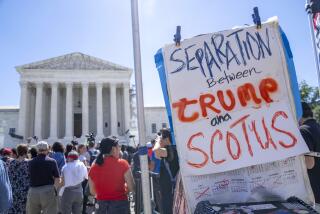Can Clinton, the Survivor, Still Lead the Nation?
- Share via
President Clinton’s admission that he lied about his relationship with Monica Lewinsky has produced a torrent of commentary on whether he can survive perjury and obstruction charges. The question, however, is not survival, but survival in what condition. This was the question that concerned the drafters when they created the impeachment clause.
In politics and law, scandals are rarely lethal, but some injuries do not heal. It is a question that the president and the public will have to consider carefully in the next few weeks. When the Constitution was written, there was considerable debate over impeachment standards and procedures. While the mechanics of impeachment were controversial, the purpose of impeachment was always clear. The drafters wanted to avoid the danger of paralysis in the presidency: the inability of a president to effectively lead without political and legal legitimacy. The drafters understood that a president’s power is derived in most part from his accepted authority as chief executive officer. When a president is found to have committed criminal acts in office, the drafters believed that he would lose both political and legal legitimacy.
In the current crisis, the president appears to have succeeded in retaining political support while losing legal legitimacy. This achievement, however, would be survival at any cost without a view to the office and its responsibilities. With the exception of handling threats from abroad, there may be little left for President Clinton beyond continuing a role as a presidential litigant.
The president will be in no position to initiate any new major domestic initiatives or law enforcement programs. This may be the best scenario for the Republicans: an unimpeached but severely crippled president who finishes the remain-der of his term more as a litigant than as a leader.
Ironically, if the president resigned, it may be viewed as his most presidential act. In doing so, he would unleash a nightmare for the Republicans by inaugurating a Gore administration with the time needed to secure reelection. Clinton also would destroy his nemesis Ken Starr in the view of the public, who would blame him for the resignation of a popular president. Finally, he could produce a sweep of both houses of Congress for the Democrats in the likely backlash.
Few, however, believe that Clinton is the resigning type. In a practical sense, if events unfold as expected, the effective presidency of William Jefferson Clinton already may be over. After depleting his resources in the pitched battle with Starr, the president may be faced this year with a new and more threatening independent counsel looking into the campaign finance scandal. This scandal raises all of the clear official misconduct issues claimed to be missing in the Lewinsky matter, ranging from illegal fund-raising practices to illegal foreign contributions and influence peddling.
Moreover, as the president deals with the final stage of the Starr investigation and the opening stage of a new investigation, he may face an old adversary: Paula Jones. Jones is pursuing an appeal in her sexual harassment case against the president and there is a possibility that the litigation could be reinstated.
The corrosive effects of these continuing investigations will be felt in both domestic and foreign arenas. The president’s alleged acts of perjury and obstruction will undermine other cases prosecuted by his Justice Department in the next two years. Citizens have been prosecuted for perjury in civil deposition as well as the use of “hypothetical” coaching of witnesses. Military personnel have been discharged for lying about “inappropriate relationships.” Likewise, the president stands accused of acts of sexual harassment that his own administration has prosecuted in other cases.
On the international front, the president has already seen the effect of his legal troubles on foreign relations. Within minutes of his ordering an attack on a terrorist base in Afghanistan, a public debate ensued on whether his motivation was not to protect but to distract our nation. Foreign leaders used the president’s difficulties to challenge the American response on the same basis.
This is why the question of survival may be more important to a president as an individual but the condition of survival is more important to the presidency. A president who can claim only political, but not legal, legitimacy holds the title to the office without the necessary mandate to govern. We may discover that the only thing worse than an impeached president is a partially impeached president.
More to Read
Get the L.A. Times Politics newsletter
Deeply reported insights into legislation, politics and policy from Sacramento, Washington and beyond. In your inbox twice per week.
You may occasionally receive promotional content from the Los Angeles Times.










